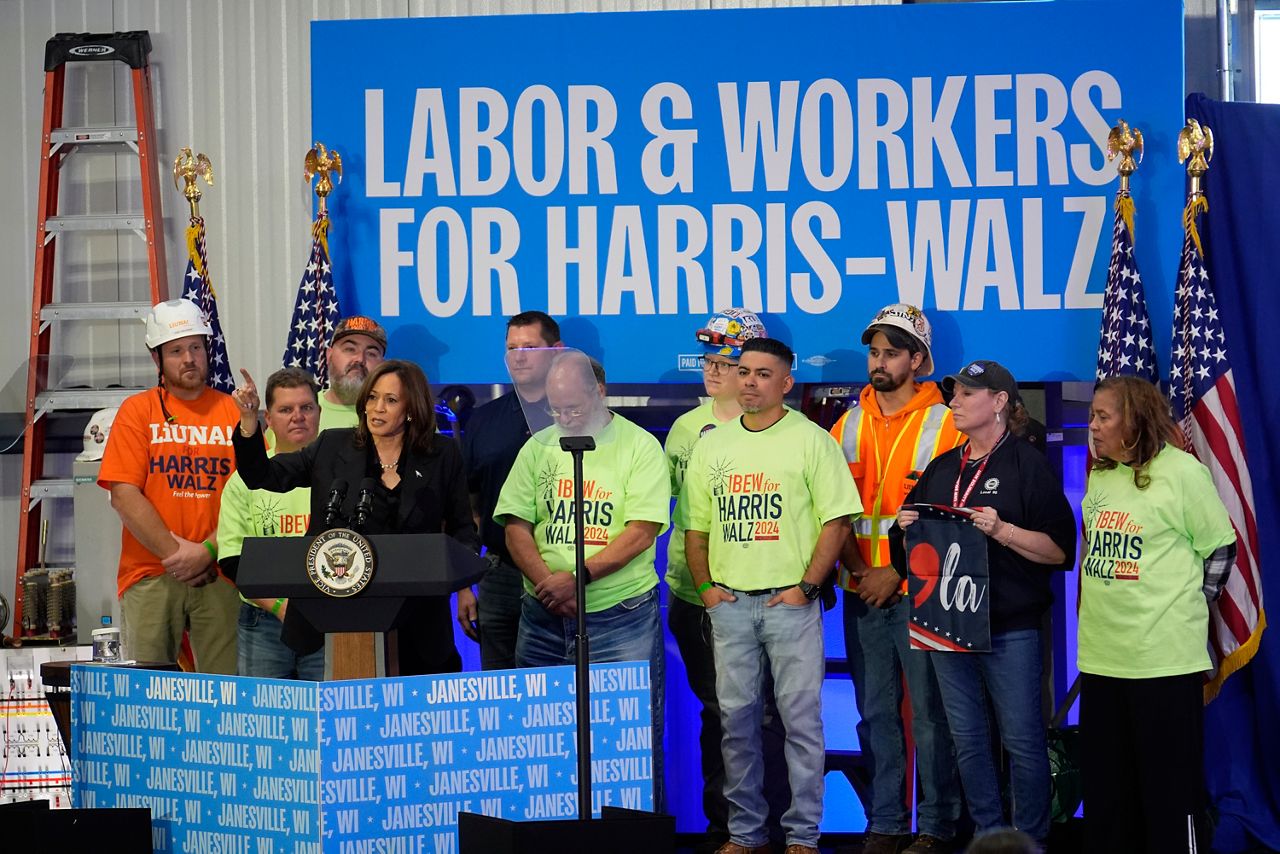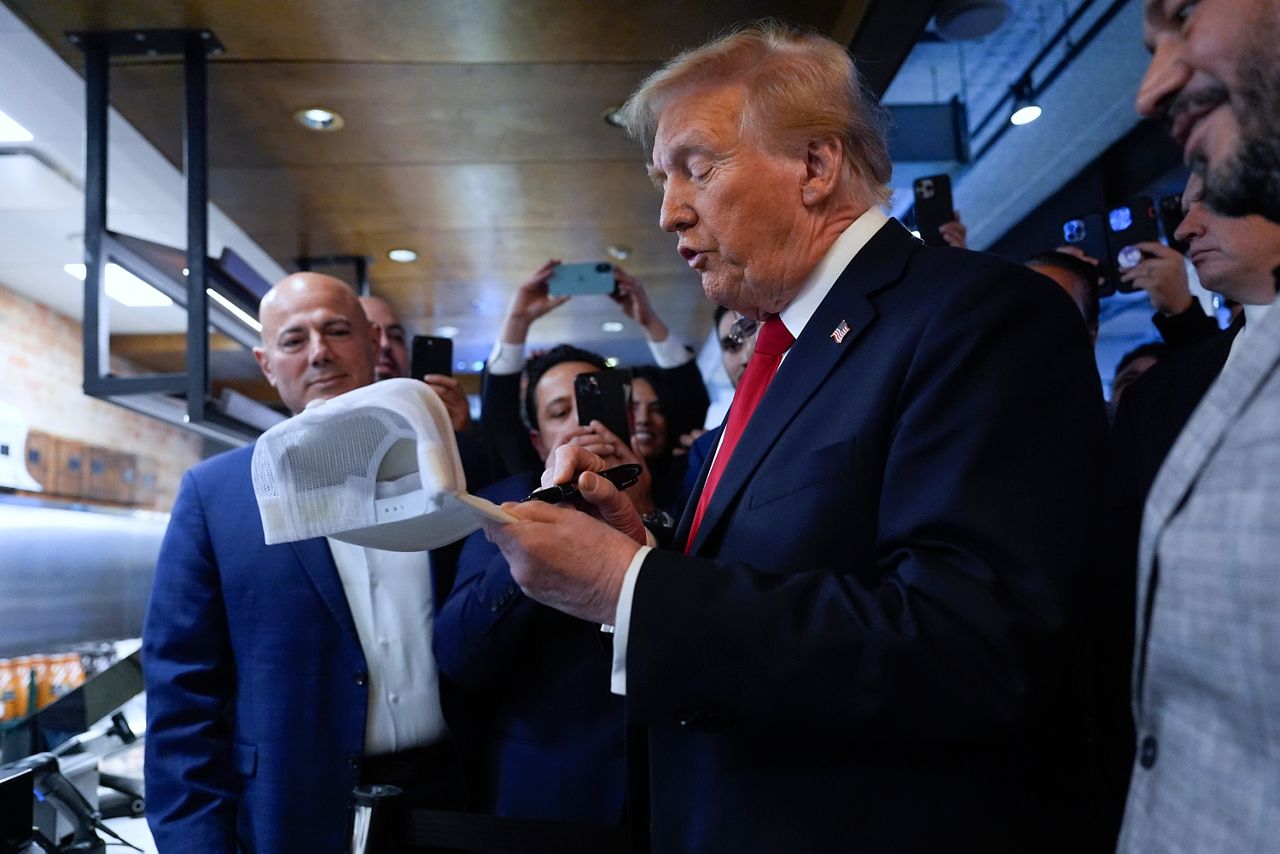The 2024 election may come down to the trio of Rust Belt battleground states that comprise the so-called "blue wall" – Michigan, Wisconsin and Pennsylvania – which helped make Donald Trump the president in 2016 and thwarted his chances of reelection in 2020 when Joe Biden flipped them back.
As the campaign for president enters its final weekend, both candidates and their running mates are descending on the two Midwestern "blue wall" states on Friday, highlighting their importance to both Trump and Vice President Kamala Harris' campaigns.
Harris rallied with union workers and leaders on Friday afternoon in Janesville, touting her economic proposals for laborers and the middle class and calling Trump's economic record "a disaster for working people."
Expressing confidence about next week's election in a must-win state, Harris urged workers to make their voices heard so the country can "turn the page on a decade of Donald Trump" and "chart a new way forward."
"We will win," she said. "And part of the reason we will win is because we know that when you know what you stand for, you know what to fight for. And we have an opportunity in this election to turn the page on a decade of Donald Trump, who has spent full time trying to have the American people point fingers at each other, full time trying to divide us, have people be afraid of each other. And folks are exhausted with this stuff, and we know that's who he is, that's not who we are.
"That's not who we are," she added. "And nobody understands better than a union member that as Americans, we all rise or fall together."

Earlier Friday, Harris came to the defense of one of the state's most famous Trump critics, Liz Cheney, condemning former President Donald Trump's comment that the former Wyoming congresswoman should have guns "trained on her face" as "disqualifying."
"He has increased his violent rhetoric, Donald Trump has, about political opponents and in great detail, in great detail, suggested rifles should be trained on former Rep. Liz Cheney," the vice president said. "This must be disqualifying. Anyone who wants to be president of the United States who uses that kind of violent rhetoric is clearly disqualified and unqualified to be president."
On Thursday night in Arizona at an event with former Fox News host Tucker Carlson, Trump called Cheney "a deranged person" and a "radical war hawk" and mused: "Let's put her with the rifle standing there with nine barrels shooting at her. OK, let's see how she feels about it. You know, when the guns are trained on her face ... they're all war hawks when they're sitting in Washington in a nice building saying, 'oh gee, well let's send 10,000 troops right into the mouth of the enemy.'"
Harris on Friday called her a "patriot" who "has shown herself to be a patriot," while making the case that Trump's comments show he does not have the fitness to hold office: "Trump is increasingly, however, someone who considers his political opponents the enemy, is permanently out for revenge and is increasingly unstable and unhinged."
"America deserves better than what Donald Trump is offering," Harris said in Wisconsin on Friday. "America deserves a president who understands our role and responsibility to our people and to the rest of the world to be a model."
The vice president was also set to attend a get-out-the-vote event in Appleton, Wisc. Both Harris and Trump will campaign in Milwaukee on Friday, with the two set to hold dueling campaign rallies just miles apart.

Trump was also holding events in Michigan on Friday, rallying in Warren and stopping in Dearborn, the country's largest Arab-majority city. Dearborn, which Biden won by a 3-1 margin four years ago, has been rocked by the Democratic administration's handling of the war between Israel and Hamas in Gaza.
Trump stopped at a restaurant in the city at the invitation of its owner. He was joined by former independent candidate-turned-supporter Robert F. Kennedy Jr., a vaccine skeptic who has recently said the Republican nominee would give him a role overseeing health policy if he wins next week.
Trump in Dearborn confirmed Kennedy will have a "big role" in health care his possible administration.
"He's going to have a big role in health care, very big role," Trump said. "He knows it better than anybody. He's got some views that I happen to agree with very strongly and I have for a long time."
He did not specify what views he shares with Kennedy.
Trump also doubled down on his comments about Cheney, calling her a "war hawk" and charged that "she kills people" and claimed during his administration, she was "pushing ... we go to war with everybody."
"She wants to go kill people unnecessarily," Trump said, later adding: "She's a disgrace."
Trump was the first major candidate this year to visit Dearborn as he works to appeal – to mixed success – to Arab Americans who may be disenchanted with Harris over her stance on the war, despite some of his own administration's policies toward Muslims.
A poll released Friday by the Council on American-Islamic Relations, the country's largest Muslim civil rights group, found that Harris is roughly tied not with Trump, but with Green Party Jill Stein, among Muslim voters. Stein leads Harris slightly 42-41, while Trump trails at a distant third with less than 10% support. (The survey, conducted this week, polled almost 1,500 Muslim voters with a margin of error of +/- 2.5%.)
The candidates' running mates will also be in Michigan on Friday. Ohio Sen. JD Vance is set to hold a rally in Portage before heading to North Carolina, while Minnesota Gov. Tim Walz is campaigning in Detroit, Flint and Traverse City to urge the state's residents to vote early.
In Wisconsin, Trump and Harris are set to rally miles apart, with the former president holding his event at Fiserv Forum – home of the NBA's Milwaukee Bucks, and the site where he accepted his third Republican presidential nomination earlier this summer – while Harris' will take place in the Milwaukee suburbs.
Harris' star-studded Milwaukee event will feature performances by GloRilla, Flo Milli and the Isley Brothers in addition to remarks from Cardi B.
Both candidates visited Wisconsin earlier this week, with Harris rallying in Madison and Trump in Green Bay. Friday's events may be their last appearances in battleground Wisconsin before Election Day.
Both sides say the race is once again razor tight for the state's 10 electoral votes. Four of the past six presidential elections in Wisconsin have been decided by less than a point, or fewer than 23,000 votes.
Democrats know they must turn out voters in Milwaukee, also home to the state's largest Black population, to counter Trump's support in the suburbs and rural areas. Harris is hoping to replicate, and exceed, turnout from 2020 in the city, which voted 79% for Biden that year.
Trump is trying to cut into the Democrats' margin. Deleon called it a “lose by less” mentality.
A lot of Democrats are "anxious and cautiously optimistic," said Angela Lang, founder and executive director of Black Leaders Organizing for Communities in Milwaukee.
“Especially given 2016 when there wasn't the same amount of energy, I think it’s clear Dems learned lessons about the importance of Milwaukee and Wisconsin as a whole,” she said.
In another late outreach effort targeting Black voters, former President Bill Clinton campaigned with local faith leaders on Thursday night at a center for celebrating African American music and arts in Milwaukee.
Hillary Clinton did not campaign in Wisconsin in 2016 after her primary loss, a mistake that Harris is not repeating. The Friday stop will be her ninth in the state as a presidential candidate and her fifth to Milwaukee or its suburbs. It will be Trump's 10th stop in Wisconsin, not counting the Republican National Convention, which was held in Milwaukee, and his third visit to the Milwaukee area.
Wisconsin Republican Party Chair Brian Schimming said that Harris having to return to the Democratic stronghold of Milwaukee shows she is on defense while Trump is on offense.
The Milwaukee Election Commission estimated on Thursday that it expects to receive more than 100,000 ballots by Election Day. But that lags early vote returns from the conservative suburbs.
“The question no one knows the answer to is who those voters are voting for,” said Wisconsin Democratic Party Chair Ben Wikler. “My feeling is that there may be some pleasant surprises for Harris.”
The Associated Press contributed to this report.



